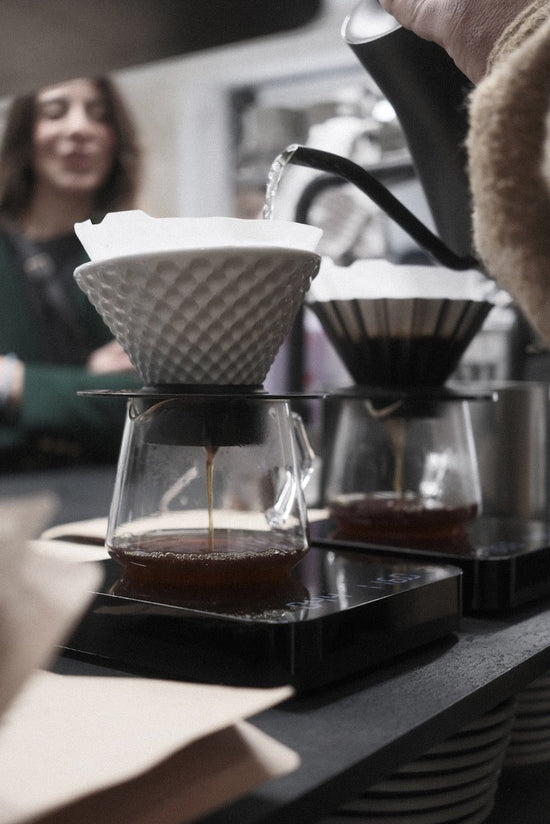In the May coffee subscription, we are roasting and shipping an anaerobic fermented cold coffee must, carbonic maceration processed java (😅 long name).
This spectacular Java variety has grown on La Esperanza farm in Quindio-Pijao, Colombia, at an altitude of 1670 meters above sea level. During days 1 and 2 of the process, the coffee must (juice or extract produced during fermentation) is taken out every 12 hours, refrigerated for 4 hours, and then returned to the tank. The pH should not fall below 3.9, and the temperature should stay below 24°C for a cool and controlled anaerobic fermentation that happens in the CM tanks to maintain floral notes.
The farm spans 13 ½ hectares, making it a significant contributor to the local coffee industry. The coffee is produced by Jairo Lopez, a third-generation coffee grower who has been cultivating coffee since he was a teenager.

What’s a cold coffee must?
During days 1 and 2 of the process, the coffee must (juice or extract produced during fermentation) is taken out every 12 hours, refrigerated for 4 hours, and then returned to the tank. The pH should not fall below 3.9, and the temperature should stay below 24°C for a cool and controlled fermentation to maintain floral notes.
What’s a Carbonic Maceration?
There are a number of experimental processing techniques in coffee, each one able to influence the distinct characteristics of coffee. However, one of the most exciting to emerge recently is a technique known as carbonic maceration.
Introduced by champion barista Saša Šestić in 2015, it’s a method of fermentation that involves placing whole cherries in a stainless-steel barrel and allowing them to sit in a carbon dioxide-rich environment.
Carbonic maceration is inspired by winemaking, which uses the process to develop grapes before crushing. Similar to wine, the extent to which carbonic maceration affects the flavors of a coffee is often determined by other factors, such as terroir.
Taste description: Notes of rose petals, peach, mango with an elegant and long finish.

In depth techniques of the process
Step 1: Cherries are picked and immediately sealed in plastic bags for fermentation overnight.
Step 2: The bags are opened, and a machine removes less dense or infected cherries.
Step 3: The team at Jairos Lopez farm separate the remaining cherries into three categories: pinton (still a bit green/yellow), ripe, and overripe. Pinton cherries undergo a longer fermentation process.
Step 4: Only perfectly ripe cherries are used for the Geisha and Java natural carbonic maceration. They are transferred to sealed plastic tanks with a 30cm headspace. A valvula with water is placed on the lid to allow the release of oxygen while trapping CO2 for natural carbonic maceration.
Step 5: During days 1 and 2, the coffee must (juice or extract produced during fermentation) is taken out every 12 hours, refrigerated for 4 hours, and then returned to the tank. The pH should not fall below 3.9, and the temperature should stay below 24°C for a cool and controlled fermentation to maintain floral notes.
Step 6: During days 3 and 4, any overly acidic coffee must is removed.
Step 7: The coffee is placed on raised African beds in a greenhouse for 20-25 days. The beds are monitored for temperature and airflow. All varieties are dried under the same roof to transfer volatile attributes and add complexity to the cup.
Step 8: Once the coffee reaches 14% moisture content, it is removed, sealed in plastic bags, and left to stabilize for three days.
Step 9: The coffee is then placed in direct sunlight to finish the drying process until it reaches a moisture content of 10.5-11.5%.
Soundtrack
Saša Šestić in 2015
STORY TOLD BY JAIRO AND HIS FAMILY
We are a family business developed by 4 brothers who were born in the mountains of Quindío, after our father migrated looking for business opportunities.
For more than 50 years in the coffee sector, we decided to reinvent our operations to adapt to the demands of a changing global economy, where the innovation and sophistication of our coffees could compete in the most demanding markets.
Our objective is to extend the varieties of our coffee portfolio, both in our cultivated varieties and in purchases from third parties, guaranteeing traceability and support in processing and respecting the environmental conditions of each crop.
One of the advantages we have as a company has been the innovation in our own processing techniques and models to achieve the best qualities.
We have a continuous supply of our products, since each crop is in its favorable environmental supply, which allows us to have a constant production throughout the year; thus maintaining an optimal development of the crop that, combined with innovation in processing, has led us to obtain the best cups. This is reflected in the recognition of our product and in the increase in its demand.
Our La Esperanza farm, located in the municipality of Pijao at 1760 metres above sea level, better known as the Quindío Mountain range, has a unique environmental offer, where our Geisha varietal is produced with a total of 36,900 trees in production on a total of 14 hectares of coffee cultivation and 5 hectares in forests and protection areas.
This farm has a 3x3 planting distance, which allows the tree to express itself and have enough space to develop and grow in optimal conditions. Through pruning we form the tree in such a way that we have a harvest throughout the year, the coffee plantations are in association with crops (citrus, banana, plantain and flowers).
We have trees from 15 months to 80 months, which guarantees us to have all the stages of the coffee bean at all times and through a good collection carried out by workers in the area, we ensure the quality of our product, we offer more than 20 jobs per farm, and we have 4 different farms located in the mountain range between (Córdoba- Buenavista and Pijao)
In our farms, the methodology of planting and caring for the environment is essential since we are aware of the change that we must make in our crops, with the non-use of chemicals, shade, pruning our trees should not be cut down for 20–25 years maintaining its production during all this time, thus keeping our legacy alive for many years.
Don Jairo Ivan López Agudelo, a civil engineer by profession, gave up a successful career to dedicate himself to his passion, the love of coffee. His father migrated to the Quindio mountain range, where he acquired land, leaving his 14 children with farms in the Quindío municipalities.
For more than 40 years, the family lived from coffee and it was 10 years ago where Don Jairo with his brothers Edilberto, Jorge and Cesar who make up the Society López Agudelo y Cia. Limitada made the decision to change their traditional cultivation farms for specialty crops with exotic varieties, such as Geisha, Java, Mocca, Bourbon and Castillo.
This society of brothers has 4 farms where their lands cover 97 cultivated hectares, where Don Jairo has been in charge of giving special management to their crops so that their development is optimal and lasting.
The Lopez family has a coffee trading company where they take care of the entire process, from harvesting the fruit to the final assembly of the green bean, where they deliver to buyers from all over the world.
The generational change is something very important in this family since Don Jairo and his brothers have followed the legacy that his father left them and now it is his children and his nephew who are in charge of the different processes. of the coffee.




